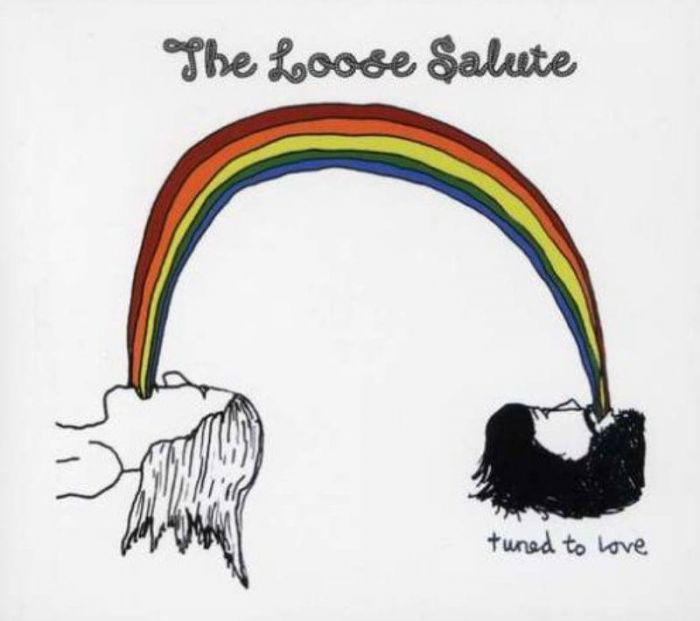Tuned to Love by The Loose Salute (Review)

A friend recently gave me a bit of a ribbing because we’re in the middle of the summer, and here I am reviewing all of this ambient music (such as my recent fixation on Dreamland Recordings’ output). To their mind, ambient music falls more under the category of “winter music,” and is not at all suitable for warm summer evenings. So I offer up for them The Loose Salute’s Tuned to Love, which, if nothing else, is a considerably more July-minded collection of songs.
If you want to get a good idea on where the band is coming from musically, just look at their pedigree. The Loose Salute was formed by Ian McCutcheon, drummer for Mojave 3 — which, as you might know, have expressed a considerable affection for the likes of Bob Dylan, Nick Drake, and Neil Young throughout their discography — and Lisa Billson, who was discovered by McCutcheon while singing Dylan covers.
Suffice to say, there’s nary a wintry wash of ambient sound to found anywhere in Tuned to Love, the group’s debut full-length. However, neither is it consistently super-sunny, up-tempo, lighter-than-air sort of album, the sort that people normally think of when they hear an album described as “summery.”
Instead, you’ll find a batch of homespun, country-inflected ballads that straddle the line between folk and rock musically, while lyrically spends as much time having good times with good friends as it does lamenting over past relationships and broken hearts. While it comes off as somewhat clichéd at first, it becomes increasingly comfortable upon repeated listens — like that chair out on the porch you always find yourself returning to on warm summer evenings, hanging out until the wee hours of the night with friends, sharing smokes and beers.
And yet even as comfortable as it might be, some delightful surprises pop up here and there.
“Death Club” starts the album off on a breezy, jaunty note, with Beach Boys-sequel organs, banjos, sparkling piano, and McCutcheon and Billson breathy vocals, singing away about getting high and lamenting youthful angst. Spanish horns waft through “Photographs And Tickets,” lending Billson’s tale of heartache and nostalgia an epic, Morricone-esque feel, lifting it up above mere navel-gazing.
“From Head To Sandy Toes” is one of the more up-tempo, carefree tracks: Billson sings, defiantly, “All we care about is rock n’ roll… We just want to let the sunshine in… We don’t care what the people sing… We’re gonna cut our discs and float away,” with shimmering steel guitar and honky-tonk pianos that eventually into a delightful extended denouement that recalls, of all things, Lush and Stereolab — albeit it with a 1970s AM radio feel.
“Through The Stratosphere To The Bars” is aptly titled, as its swaggering rhythms, steel guitar, and strutting vocals sounds quite at home in some dingy gin joint. Indeed, one can almost smell the Budweiser, cigarette smoke, and stale pretzels within the first 30 seconds. Like many of the album’s songs, The Loose Salute are obviously riffing on numerous clichés in their music, but there’s a refreshing lack of irony or tongue-in-cheekiness to it all. One almost takes the press release at its word, that the band are “bringing out the sheer sense that creating music is a celebration, not a labor”
That being said, the album’s finest moments come when they delve a little deeper into the summer mood, and become a little more reflective. “The Mutineer” is wonderfully subdued, all of the instrumentation — layers of acoustic guitar, flute, and gently melancholy strings — moving in a delicate, dreamlike fashion akin to The Clientele. And McCutcheon’s hushed vocals only add to that feel, turning the song into a soft confessional of sorts.
“Ballad of the Dumb Angel” is just waiting for Wes Anderson to include it in one of his movies — perhaps during a scene in which a character finds they’ve hit rock bottom or are coming to terms with whatever tragicomedy has come their way. It has that same inimitable feel as the songs that Anderson often uses in his films, songs that underscore the often-quirky scenes and lend them the necessary emotional heft.
Tuned to Love winds down with “Ship on the Ocean,” the album’s darkest — and strongest — song. Here, Billson’s voice really shines, moving from soft and hushed to evocative and pining on the song’s chorus. With the weeping steel guitar and organ, the song plays out like the inevitable, sobering comedown after a night of partying, where you stumble home at three in the morning with a fuzzy head, lost and directionless, knowing that such revelry can’t last, that real life marches on, that summer eventually comes to an end.
It’s a fitting way to end Tuned to Love, an album that is, for the most part, drenched in good times and a “devil may care” attitude — and a surprisingly affecting on at that. As such, this is probably an album that I’ll pull out more often through the summer than those that promise endless, up-tempo summer fun.